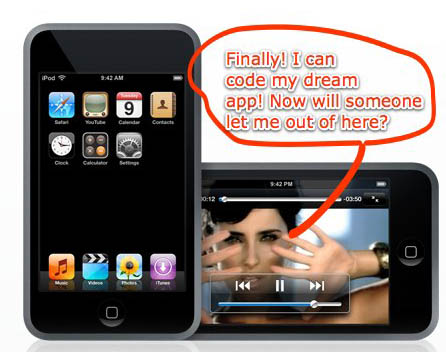
Mobile music creation week continues! Happy Valentine’s Day, a few months early. This February, you’ll be able to light some candles, pour a bottle of wine, and start developing real applications for the iPod Touch and iPhone, fulfilling a dream a lot of us had when we first saw the iPhone last January. (And yes, this means that iPod Touch interface for MainStage you’ve been imagining can now be a reality.) Sayeth CEO Steve (on Apple Hot News; no direct link yet):
Let me just say it: We want native third party applications on the iPhone, and we plan to have an SDK in developers’ hands in February.
So what was the holdup? Building a secure platform:
Some claim that viruses and malware are not a problem on mobile phones—this is simply not true. There have been serious viruses on other mobile phones already, including some that silently spread from phone to phone over the cell network. As our phones become more powerful, these malicious programs will become more dangerous. And since the iPhone is the most advanced phone ever, it will be a highly visible target.
To some of Apple’s defenders who claimed this was the plan all along, this will be a “told you so” moment. They may be right, they may be wrong; it’s impossible to know what’s going on inside Apple. But either way, I think it’s safe to say that months of criticism from the developer communities and Mac community as a whole sent a clear message to Apple that open platforms and open development are important. Whether it influenced the decision to build the SDK, increased its priority, or simply prompted this announcement, it did have an effect.
And that’s a message not just to Apple, but other hardware makers. We’re living in an age of developers. JavaScript is great. But real apps are great, too. Developers want open platforms they can build upon. Savvy users are increasingly able to hack unusual creations to customize the hardware they buy. And non-programmer users very often want to choose how they use the gear they invest in. The iPhone and iPod Touch are already terrific devices, but they’re likely to be even better when users can use them the way they want.
Regardless, Apple: thank you.
One side note. It’s a little disappointing to me that Apple still rejects Java, which works quite well on mobile devices, allows cross-platform development, and has been addressing security concerns like these for years. (That’s part of why other phone makers are able to allow apps without security getting in the way.) At the same time, though, the potential of the iPhone’s UI and hardware interface are uniquely well-suited to a specific developer kit; much as I love Java, I think Cocoa is probably the better tool here. (I do like Java for desktop tools, so it’ll be interesting to see what Apple has done with Java 6 in Leopard; stay tuned.)
But in the meantime, I’m going to save my pennies and fiddle with multi-touch using the finished SDK in February. If it’s worth the wait for Apple, it’ll be worth the wait for me. As I spent yesterday watching DJs and event promoters fiddling with their iPhones, I still think gestural interfaces for multimedia really could be fantastic, not as a replacement for other expressive gadgets, but as a complement to them. (Just charge up that battery.) I’m excited to see what happens next, not just on Apple’s gear, but other devices, as well.
Have a candy heart.